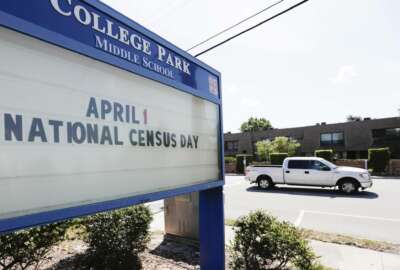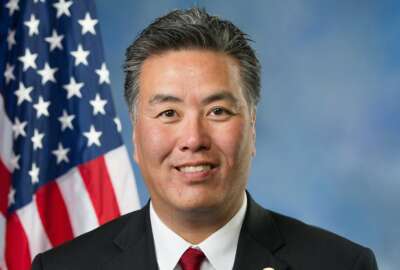
Bill in Congress would allow those suspected of crimes to find what algorithms are being used against them
Forensic algorithms have become a routine tool for federal law enforcement agencies. The Government Accountability Office finds the algorithms are used to tie crime...
Best listening experience is on Chrome, Firefox or Safari. Subscribe to Federal Drive’s daily audio interviews on Apple Podcasts or PodcastOne.
Forensic algorithms have become a routine tool for federal law enforcement agencies. The Government Accountability Office finds the algorithms are used to tie crime scene evidence to individuals with fingerprints or DNA on record. Now California Rep. Mark Takano (D) has introduced a bill that would give defendants access to the source code of the algorithms. He joined the Federal Drive with Tom Temin to discuss.
Interview transcript:
Tom Temin: Good to have you on.
Mark Takano: Pleasure to be here.
Tom Temin: So what is the concern here? First of all about these algorithms and the way they’re used by federal and perhaps state and local law enforcement also?
Mark Takano: Well, the principal concern is about due process rights of criminal defendants. And in cases, forensic algorithms may be the only evidence that is introduced in court against a particular defendant. And defendants have a very unclear ability to cross examine that evidence before them. Now a forensic algorithm is not a human being. It’s not an expert that can be put on the stand and cross examined and their expertise analyzed and put before a judge and a jury and questioned. A forensic algorithm is source code. And in cases where defendants have asked for that source code to be made available, and to be shown how probabilistic genotyping works with a forensic algorithm, courts have often ruled against them and said, no, you don’t have a right to examine that code in deference to the software developers’ proprietary interests, financial interests. And so in effect, what I see happening here is that the profit making proprietary interest of software developers is trampling upon the due process rights of criminal defendants. And this goes against, I think, a core principle of our justice system, which is based on an adversarial system where counsel for the accused has a robust ability to question and examine evidence brought against [the] defendant.
Tom Temin: So the issue basically is these algorithms act as black boxes and give out an answer and says yes, this sample of DNA is probably, you know, 90% probability that person that we have on record, but as a black box, unless you can look inside it, you can’t really verify law enforcement’s conclusion.
Mark Takano: That’s correct. And more than that, even the access to the testing how these programs are tested, all of this is in the proprietary domain. And the defendant already has a steep hill to climb in terms of, especially if you’re a low income defendant being able to get independent testing of this equipment to look at the data, the underlying data, and to just understand how the source code processes all of this information. So we think there’s also a role for the federal government. My bill would amend Article V of the Federal Rules of Evidence so that trade secret privileges cannot be used by the developers or owners of forensic algorithms in order to prevent defence access of evidence that they would otherwise be entitled to. It amends Rule 16 of the Federal Rules of Criminal Procedure to require a report to the defense on the output of forensic algorithms used in their case that includes the name of the company, developing the software, the name of the lab, where the test was run, the version of the software used documentation of procedures followed by the lab, and other information deemed necessary to include on NIST standards. And now we refer to NIST here – this which is the National Institute of Standards and Technology. Here, my act would direct NIST to establish a computational forensic algorithms standards and computational forensic algorithms testing program. It also requires NIST to collaborate with outside experts in forensic science, bioethics, algorithmic discrimination, data privacy, racial justice, criminal justice reform, exonerations and other relevant areas of expertise identified to the public trust. And further, we would directness to address the potential for disparate impact across protected classes and standards and testing. And it requires public input into the standards and testing program, and requires available documentation of resulting standards and testing of software. Essentially, the ability of defendants to be able to do all of this is prohibitively expensive. We need a government agency to help create a level playing field for defendants and prosecutors. Right now I see it as too much weighted in favor of prosecutors and the software developers who as of right now, may or may not be required – well they actually aren’t required to open it up. The judges have sided with their proprietary rights. And I believe that Congress needs to sort of uphold the constitutional due process rights of defendants.
Tom Temin: We’re speaking with California Rep. Mark Takano. What about a provision in there to say if the opposition of the defense can see the source code and so on, that they are obligated not to disclose it further. So at least the proprietary interest of the vendor is preserved, and yet the access is there for people that need it for purposes of defense.
Mark Takano: You know, I don’t know if we include that in the bill. But that’s certainly something that could be examined as the bill goes through hearings, and I’m very pleased to tell you that the Science, Space and Technology Committee has indicated interest in holding hearings, and this is certainly something that we can see as workable. But the bottom line is that software companies must contend with a bedrock principle of due process. It could be the case that we find out that it’s an unworkable standard to impress upon the defense. In any case, what must be upheld is the ability of the defense to examine, question – to question the validity and to be able to test software.
Tom Temin: And do you have Republican co-sponsorship or interest or some agreement that on a bipartisan basis that something could happen?
Mark Takano: We’re in the process of trying to reach out to Republican offices. I am optimistic that Republican interest will be piqued. I’m unabashedly a progressive Liberal Democrat. But I find that when we posted about this on my social media, many of my detractors, some might call them trolls, said this is the first time you’ve done something that I agree with, because many of my detractors view themselves as defenders of the Constitution and invoke the constitution frequently, and I think this topic piqued their interest and folks that are normally very hostile, antagonistic were like – you know, I got comments like, “well, this is interesting that you would do this.” So it’s a topic upon which I think many on the left and the right can come together on.
Tom Temin: And do you have any sense of reaction from the FBI at all? I mean, they were cited in the GAO report as the primary user of this type of evidence.
Mark Takano: Well, let’s talk about that a little bit. I haven’t heard a formal staff-level responses from the FBI. I would say that the FBI ultimately in a lot, you know, in its its long term interests has to also be concerned about the validity of these tests. And we’ve seen technology, the RF technology, tantalize and capture law enforcement before, whether it was lie detector tests – lie detector tests captured the attention of law enforcement until they were proven to be unreliable, right? I think we have to always guard against the notion that the sheen of technology, the aura of technology, and we have to pull back the curtain somewhat to show people and the public: This is a human made technology and it’s subject to human made vulnerabilities and biases that might be built in. But let’s get back to the GAO report. The GAO report was requested by my office, we’ve got a preliminary installment of the first installment of that report, which is a 3,000-foot view of the technology. It’s a primer, basically explaining how such technologies work. And we’re expecting a second installment, which brings with it GAO’s sort of observations and analysis of how it applies to policy and they’re going to actually issue some recommendations. I gotta say GAO has done a remarkable job of hiring a core of experts in science and technology, and has this capacity to take on a topic like this. I have long been an advocate for restoring the Office of Technology Assessment in the House of Representatives, precisely because we need greater capacity to take on topics like this. They’re often obscure, esoteric, mainly because members have limited staff capacity to be able to take on these topics. And I think I’m grateful that the GAO has built up this unit within their agency. I think it needs to also be complemented by congressional arm and they can work hand in hand, but I’m eagerly waiting for the second part of this report from the GAO.
Tom Temin: Democrat Mark Takano represents California’s 41st district. Thanks for joining me.
Mark Takano: Oh, you’re welcome. Thank you for your interest.
Tom Temin: We’ll post this interview at FederalNewsNetwork.com/FederalDrive. Hear the Federal Drive on demand. Subscribe at Apple Podcasts or Podcastone.
Copyright © 2025 Federal News Network. All rights reserved. This website is not intended for users located within the European Economic Area.
Tom Temin is host of the Federal Drive and has been providing insight on federal technology and management issues for more than 30 years.
Follow @tteminWFED
Related Stories

Bill in Congress would allow those suspected of crimes to find what algorithms are being used against them




